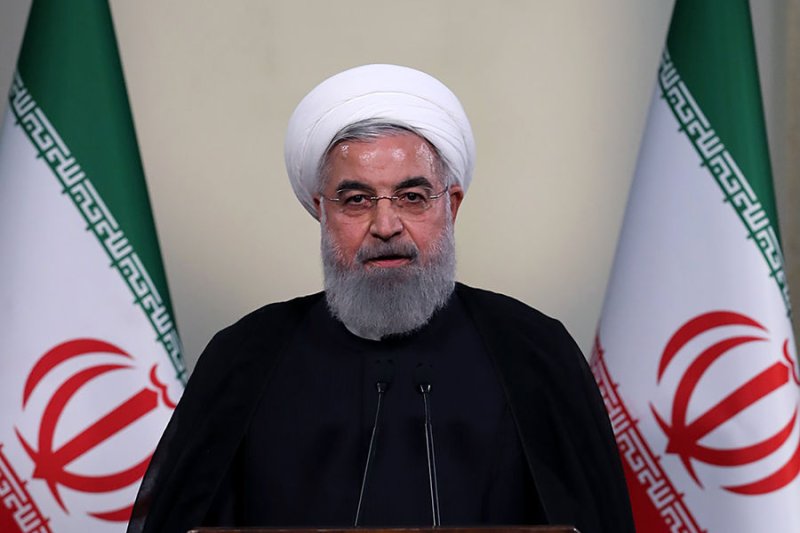Iranian President Hassan Rouhani says there's still support for keeping sanctions pressure off his country from China, the Europeans and Russia. Photo by the Iranian Presidency Office / UPI |
License Photo
Aug. 7 (UPI) -- A position taken by parties to the Iranian nuclear deal shows there's interest in keeping oil exports flowing and banking channels open, Iran's president said.
U.S. President Donald Trump on Monday signed an executive order that re-imposed sanctions on Iran that were lifted when the United States was party to the Joint Comprehensive Plan of Action. The JCPOA kept Iranian oil flowing in exchange for commitments from Tehran to scale back its nuclear ambitions.
Trump said the JCPOA was flawed and allowed Iran to use oil revenue to fund malign activity rather than support the welfare of the Iranian people.
A senior U.S. State Department official explained on Monday that it was Iran's own behavior on the global stage that was to blame for recent economic woes
"The regime's systematic mismanagement of its economy and its decision to prioritize a revolutionary agenda over the welfare of the Iranian people has put Iran into a long-term economic tailspin," the official said.
Sanctions that went into force on Tuesday target Iran's access to the U.S. dollar, its trade in gold and other precious metals, and other financial measures tied to the national currency, the rial.
Iranian President Hassan Rouhani said the main impact from sanctions will be felt in November when U.S. action extends to Iranian oil sales.
"Today's sanctions are apart from banks and oil, and the promise given by Europe, China and Russia is that they can stand against it, for both our oil sales and keeping our banking relations with the world," he said.
European Union blocking statute aimed at protecting European companies doing business with Iran went into force Tuesday. The measure forbids compliance with U.S. sanctions without explicit authorization.
"The blocking statute allows EU operators to recover damages arising from U.S. extraterritorial sanctions from the persons causing them and nullifies the effect in the EU of any foreign court rulings based on them," the measure reads.
China and Russia have shrugged off the U.S. pressures. Farhan Haq, a spokesman for U.N. Secretary-General António Guterres, said Monday the world body views the JCPOA as a "diplomatic achievement and continues to encourage support for all governments for that, and we will continue to do so."
Iran's president said companies may still be impacted by U.S. sanctions despite the support for the nuclear agreement. Meetings between Iran and the remaining signatories to review efforts to save the deal are set for late August.















